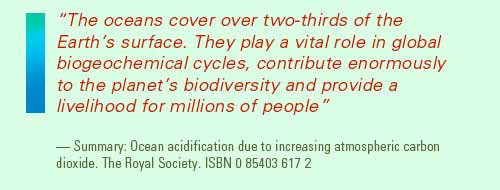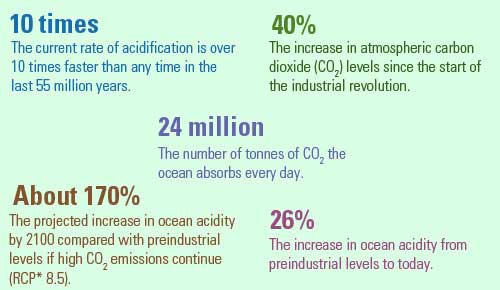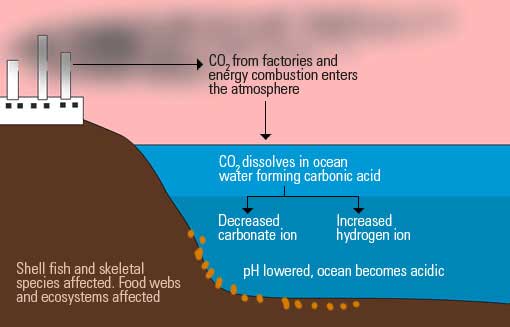
Ocean acidification is one of the top environmental issues today. It is simply a term that means the oceans are becoming more acidic. This trend is pretty worrying to environmental scientists, as they have studied this to know that almost all ecosystems (particularly those of the upper oceans) will be affected in one way or the other.

What is ocean acidification?
It is the changes in the chemical make-up of all the waters in the oceans, as well as its temperature, resulting from excess carbon dioxide in the atmosphere. The changes involve the lowering of the pH of the water.
To understand this better, we need to first understand what pH is, together with atmospheric Carbon Dioxide.
What is pH of water?
pH of water is the measure of how acidic or basic water is. The scale is from 0 to 14, and 7 is the neutral point (pure water). If the pH is closer to 0, that water is more acidic. If it is closer to 14, the more basic it is.
“During the last 20 years, it has been established that the pH of the world’s oceans is decreasing as a result of anthropogenic carbon dioxide emissions to the atmosphere.” *1
Lower pH seas and oceans are known to cause major problems for marine organisms and ecosystems.
Carbon Dioxide (CO2)
The atmosphere is made up of air, and air is composed of gasses including: Oxygen 21%, Nitrogen 78%, Argon 0.9% and Carbon Dioxide
(![]() ) 0.04%. These gasses occur naturally in the atmosphere. However, the concentrations of atmospheric
) 0.04%. These gasses occur naturally in the atmosphere. However, the concentrations of atmospheric ![]() in the atmosphere have increased a lot since the industrial revolution. Humans are burning a lot more fossil fuels than ever before. Fossil fuels are the main source of
in the atmosphere have increased a lot since the industrial revolution. Humans are burning a lot more fossil fuels than ever before. Fossil fuels are the main source of ![]() . It is known that the Amazon, together with other major forests covers are large absorbers of
. It is known that the Amazon, together with other major forests covers are large absorbers of ![]() from the atmosphere, but in fact, the Oceans, are the largest carbon sinks on the planet.
from the atmosphere, but in fact, the Oceans, are the largest carbon sinks on the planet.
How fast is ocean chemistry changing?
Since the Industrial Revolution, the world’s oceans have become 30 percent more acidic, on average. Scientists predict the acidity of our oceans could double or triple by the end of the century compared to preindustrial times. Natural Resources Defense Council., Gulf of Maine, Ocean Acidification: http://www.nrdc.org/oceans/acidification/files/ocean-acidification-maine.pdf

Source: Ocean Acidification. Summary for Policymakers. UNESCO
What is causing the ocean's acidification?
Ocean waters are constantly reacting with environmental gasses. In particular, the oceans absorb up to half of the carbon dioxide in the atmosphere. They play a key role in the carbon cycle too, by acting as a carbon sink (store).
In this case, the upper level or layer of the ocean or seawater (![]() ) absorbs
) absorbs ![]() , forming Carbonic acid. The chemical symbol for carbonic acid is
, forming Carbonic acid. The chemical symbol for carbonic acid is ![]() .
.
Here is the chemical equation:
![]() +
+ ![]() =
= ![]()
The result of this reaction increases Hydrogen ions in the water, and reduces carbonate ions. The reaction also leads to a reduction of the pH by about 0.1 units. Remember that the lower the pH, the more acidic the water is.

Note that the margin may look small, but the effect on living organisms depending on carbonate ions is very significant.
The IPCC forecasts that ocean pH will fall by "between 0.14 and 0.35 units over the 21st Century, adding to the present decrease of 0.1 units since pre-industrial times" *1
Water pH levels are not consistent across the globe. Some places such as the eastern Pacific have lower pH, whiles the arctic ocean area has a higher pH.
The above conditions are normal, but unfortunately, the earth has seen an increase in Anthropogenic ![]() concentrations since the industrial revolution. (Anthropogenic
concentrations since the industrial revolution. (Anthropogenic ![]() is the portion of atmospheric
is the portion of atmospheric ![]() resulting from human activities such as burning fossil fuels) As a result, more
resulting from human activities such as burning fossil fuels) As a result, more ![]() is absorbed by ocean water, as the equilibrium point has changed a bit.
is absorbed by ocean water, as the equilibrium point has changed a bit.